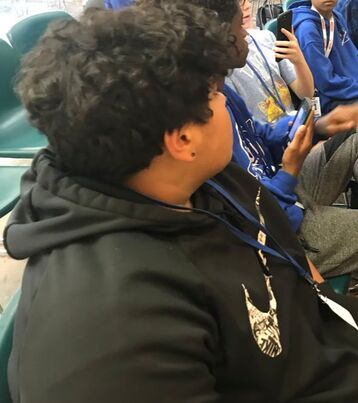 The following narrative is written from the third-person omniscient point of view. Keep in mind that the teacher, working with a small group of students in the back of the classroom, does not have all of the information that you, the reader, do. January rolled in and it was time to prepare for State Testing. Isaiah Sanchez’s accomplished teacher differentiated instruction by grouping the class by their formative results. Naturally, the groups weren't labeled, but the students could discern the teachers' grouping by who was in each group. Isaiah was in the "at level" group, but he was bored and listening to the extension group tackle some math challenges he knew he could do. His friend Aiden (who never let anybody forget that he was in the gifted and talented program) was in the extension group and having a very interesting conversation. Isaiah wondered: why couldn’t he work with them? His teacher always told them to “challenge themselves.” Isaiah walked over to interrupt his teacher as she struggled through story problems in the "remediation group." “Ms. Teacher, I’m bored. Can I work with that group?” She signed. “No, Isaiah. Don’t worry about it, you’re fine. You approached the standard on the assessment.” Isaiah just stood there, frowning in protest. The teacher was eager to get back to her small group tutorials, and she didn’t tell Isaiah this, but she did not want him joining the group of high-performing students because she viewed him as a behavior issue, and expected him to get the other students off task. “You’re good!” She repeated. “You did as well as you could on the assessment.” “What do you mean?” Isaiah persisted. Now the teacher was getting frustrated with him. “You did as well as anyone would expect. Now please go sit down.” “...as well as you could,” “..as anyone would expect.” These words stuck in Isaiah’s mind as he begrudgingly trudged back to his desk. As he did so, his eyes traveled to his teacher’s desk, where for some reason, he saw his name handwritten on a list and “SPED” scrawled in big letters next to his name. He was confused. He knew he was only in the Special Education program because of his challenges articulating certain letter sounds. Perhaps his teacher knew something he didn’t? He glanced up to see Aiden smiling smugly at him. He must have overheard his conversation with the teacher because he mouthed: “DUMBY” to Isaiah. That was all it took. Isaiah stood up from silent reading with a growl and threw his desk across the classroom. The teacher stands up from her desk, shocked. This explosive behavior seemed to erupt out of nowhere! She orders Isaiah out of the room until she can figure out what to do. What was Isaiah attempting to communicate with his behavior? He did not consciously understand what he was feeling, or have the words to express it. But what was his behavior communicating? When we understand the child’s behavior as an expression of what they do not have words to say, we change our response to that behavior. We no longer try to shape their behavior, instead, we try to listen. Comments are closed.
|
AuthorElise White Diaz is an Educational Consultant with Seidlitz Education, specializing in trauma-informed multilingual education. CategoriesArchives
July 2024
|

 RSS Feed
RSS Feed
